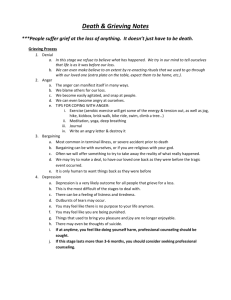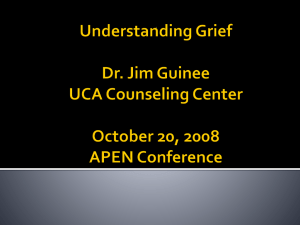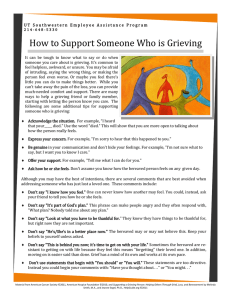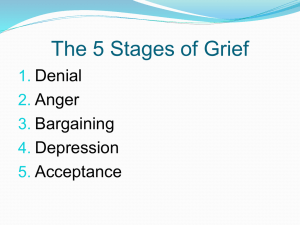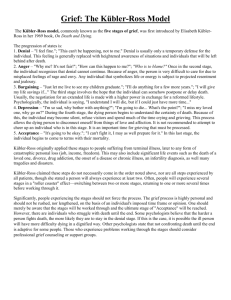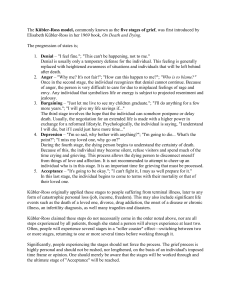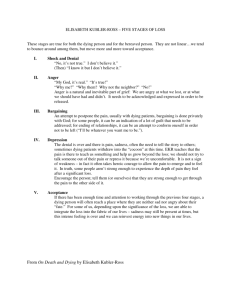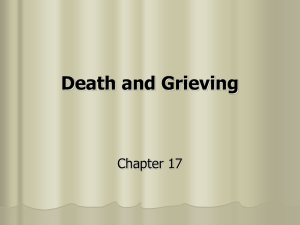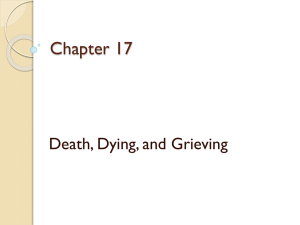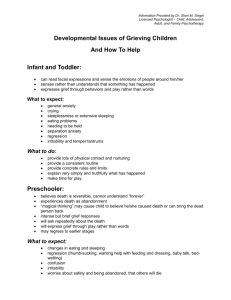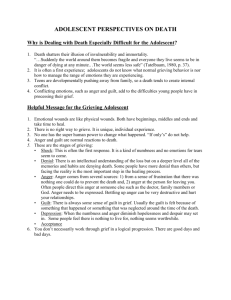Death and Grieving PowerPoint presentation
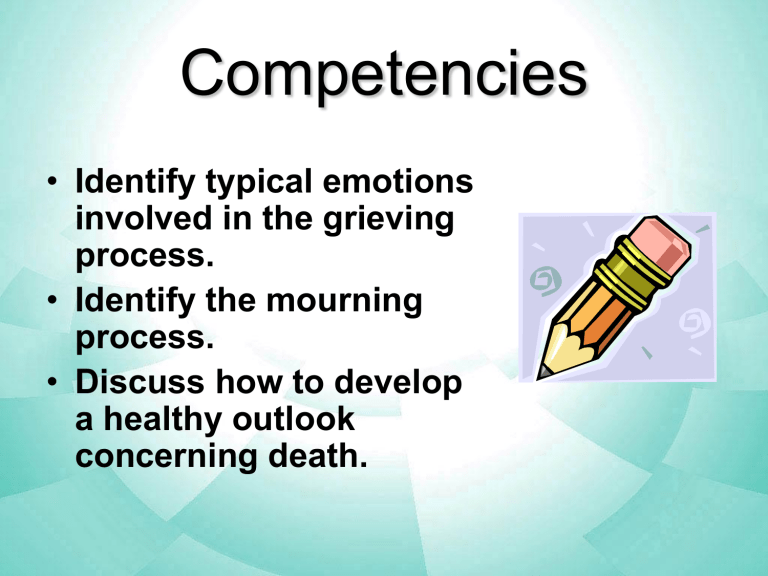
Competencies
• Identify typical emotions involved in the grieving process.
• Identify the mourning process.
• Discuss how to develop a healthy outlook concerning death.
It is a far, far better thing that I do, than anything I have ever done; it is a far, far, better rest that I go to, than I have ever known.
-Charles Dickens
Death and Grieving
When you were born, you cried and the world rejoiced.
Live your life in a manner so that when you die the world cries and you rejoice.
--Native American Proverb
• It is a far, far better thing that I do, than anything I have ever done; it is a far, far, better rest that I go to, than I have ever known.
• -Charles Dickens
Strange as it may seem, death is a part of living. Where did you learn your ideas or views about death?
• Family
• Religious beliefs
• Superstitions
• Experiences with death
• Attitude toward life
• Mental health
• Media
• Science
1. How would you define Death?
Where do Sparrow’s
Go to Die?
Writing Situation
As you listen to this story pay particular attention to your own emotions and attitudes about death.
Also pay attention to the things that come to your mind concerning death.
Writing Description
In a two paragraph essay discuss your experiences with death. You should discuss any close loses, feelings about death etc.
Make sure you use correct english.
Where do Sparrow’s
Go to Die?
2. Why do most people dislike talking and thinking about death?
3.
What positive and negative statements could you make about your life thus far?
4.
What are some ways people deny that death is part of everyone's life?
• MANY PEOPLE AVOID USING THE WORD
DEATH OR DEAD ,
• PEOPLE DO NOT MAKE WILLS,
• PEOPLE DO NOT MAKE ARRANGEMENTS
FOR WHAT WOULD HAPPEN IF THEY DIED,
ETC.
5. What do you fear most about dying?
6.
Name the three major stages the body passes through in dying and briefly describe what happens in each stage.
a. CLINICAL DEATH —WHEN THE HEART AND
LUNGS CEASE TO FUNCTION b. BRAIN DEATH —LACK OF OXYGEN TO BRAIN
CELLS c. CELLULAR DEATH —WHEN OXYGEN IN THE
TISSUES AND ORGANS IS DEPLETED
AND ALL FUNCTIONS SLOWLY CEASE
7.
How is it possible that there can be disagreement concerning whether or not a person is dead.
(BECAUSE OF MEDICAL TECHNOLOGY,
MACHINES CAN KEEP A BODY FUNCTIONING
EVEN THOUGH THE INDIVIDUAL IS NO
LONGER AWARE OF HIS/HER EXISTENCE.
MANY PHYSICIANS DISAGREE AS TO HOW
LONG CERTAIN MEDICAL TESTS SHOULD BE
PERFORMED TO DETERMINE IF DEATH HAS
INDEED OCCURRED.
Grief
• The pain, discomfort, mental and physical feeling that most people feel following the death of a loved one.
• People suffer grief at the loss of anything. It doesn’t just have to be death.
8.
List the stages of dying and grieving. Write down the characteristics of each stage.
Grieving
Process
Denial
Denial
• In this stage we refuse to believe what has happened. We try in our mind to tell ourselves that life is as it was before our loss.
• We can even make believe to an extent by re enacting rituals that we used to go through with our loved one.
• We set an extra plate at the table.
• We expect them to be there when we get home.
• We flash back to memories and conversations.
• These are all part of this stage.
Anger
Anger
• We get angry.
• The anger can manifest itself in many ways.
• We blame others for our loss.
• We become easily agitated having emotional outbursts.
• We can even become angry at ourselves.
• Care must be taken here not to turn the anger inwards.
• Release of this anger is essential!
Bargaining
Bargaining
• Bargaining can be with ourselves or if you are religious with your god.
• Often we will offer something to try to take away the reality of what really happened.
• We may try to make a deal, to have our loved one back as they were before the tragic event occurred.
• It is only human to want things back as they were before.
Depression
Depression
• Depression is a very likely outcome for all people that grieve for a loss.
• This is the most difficult of the stages to deal with.
• There can be a feeling of listness and tiredness.
• Outbursts of tears may occur.
• You may feel like there is no purpose to your life anymore.
• You may feel like you are being punished.
• Pleasure and joy may be difficult to express.
• There may even be thoughts of suicide.
• If you at any time in this stage, feel like doing yourself harm, professional counseling should be sought.
Acceptance
Acceptance
• This is the final stage of grief.
• It happens when you know that you have to go on.
• You can accept your loss and now be able to regain your energy and goals for the future.
• It may take some time to get to this stage..but you will get there!
Coping with
Crisis
Physical Reactions
Tightness in Throat
Disinterest in Eating
Can’t
Sleep
Unfeeling
Tired
Emotional Reactions
Anxiety
Stabbing Pain
Hostility
Feeling of Relief
Fear
Anger
Mourning
Process
Shock
• Occurs between the time of death and time of the final arrangements.
• During “Shock” one may even deny that the death has occurred.
Intense Feeling of
Loss/Pain
• Usually occurs two to three months after the loss.
• The bereaved person may withdraw from the world.
Resolution
• One starts living a regular life.
Anticipatory Grief
• The mourning process that occurs prior to death in cases of terminal illnesses.
9.
Describe some ways that persons go through a kind of mourning when they experience losses other than death.
10. Explain some problems experienced by family and friends as they cope with the death or dying of someone dear to them.
• THE BEREAVED PERSON MAY SHOW
EMOTIONAL AND/OR PHYSICAL
DISORDERS SUCH AS INSOMNIA,
WEIGHT LOSS, HEADACHES, ETC.
11. Four Basic Needs of the
Bereaved
Companionship
Ventilation of
Feelings
TIME
Time Alone
12. What are some appropriate things to say to the bereaved?
• "IT'S OKAY TO CRY,"
• "I JUST WANTED YOU TO KNOW I AM
THINKING ABOUT YOU."
13. What should you avoid saying to the bereaved?
• "CHEER UP,“
• " TIME WILL HEAL ALL WOUNDS,"
• "HE/SHE IS BETTER OFF,"
• "IT WAS GOD'S WILL,"
• "CALL ME IF YOU NEED ME."
14. Describe some ways to express condolences.
• DONATION TO A FAVORITE CHARITY,
• PERSONAL LETTER,
• FLOWERS,
• PHONE CALL,
• GIFT OF MONEY,
• GIFT OF FOOD,
• VISIT,
• AND ASSISTANCE SUCH AS MOWING THE
LAWN, COOKING MEALS, DOING LAUNDRY,
BABY SITTING, MAKING PHONE CALLS,
ETC.
15. Describe some local customs concerning funerals.
16. How might costs affect the funeral arrangement made by the survivors?
QUITE OFTEN THE FINANCIAL SITUATION
OF THE FAMILY DICTATES HOW
EXTENSIVE A FUNERAL SERVICE CAN BE.
IF ALL EXPENSES HAVE BEEN ALLOWED
FOR IN THE DECEASED'S WILL, THE
FAMILY SHOULD BE ABLE TO ARRANGE A
SERVICE AS WISHED BY THE DECEASED.
17. What is the purpose of a memorial service, funeral, or visitation?
• WITHOUT FUNERALS AND
VISITATION, THE PROCESS OF
COMING TO ACCEPT THE DEATH OF
A LOVED ONE WOULD, FOR MANY,
NEVER BE COMPLETE. FUNERALS
ALLOW FOR THE OPEN CARING,
GRIEVING, AND EXPRESSING THAT
THE HUMAN ANIMAL SEEMS TO
NEED TO REORDER LIFE AND
RETURN TO ROUTINE LIVING.
Eulogy
• Write an Eulogy.
• Be creative in your approach.
• Write something by which you will truly be remembered.
Your Name:…………..Age:………..died yesterday from:…………………………….
He/she was survived by:…………………….
At the time of death, he/she was working on becoming………………………………………
He/she made contributions in this area:…
He/she always hoped to:………………………
The body will be:…………………………………
My Life
• 3 – FF to picture of camera. End when he says, “well this is me.”
• 6 – Dr. explaining he won’t live long. End when Dr. says, “Don’t make it any more painful than it has to be.”
• 21 – End when Gale says, “Oh, Mom.”
• 24 – End when scene is over, “We all are” said by Father.
• 26 – End at end of roller coaster ride, seeing light.
Step Mom
• 16 – Kids told of mother’s cancer. End when Anna runs upstairs.
• 27 – How each child reacts differently to death. End after the second child’s gift and talking.
Summary
• In the past, people were born and died at home with their families nearby. Most people died in their own beds. Death was considered a natural part of the life cycle. Today most deaths occur in hospitals; the dying are often surrounded by medical personnel instead of family members. Death has become a remote subject that many people avoid discussing.
Coping with crisis may is a necessary skill that will be required of all people at various times in their lives.
The caterpillar dies so the butterfly could be born.
And, yet, the caterpillar lives in the butterfly and they are but one. So, when I die, it will be that I have been transformed from the caterpillar of earth to the butterfly of the universe.
-- John Harricharan
